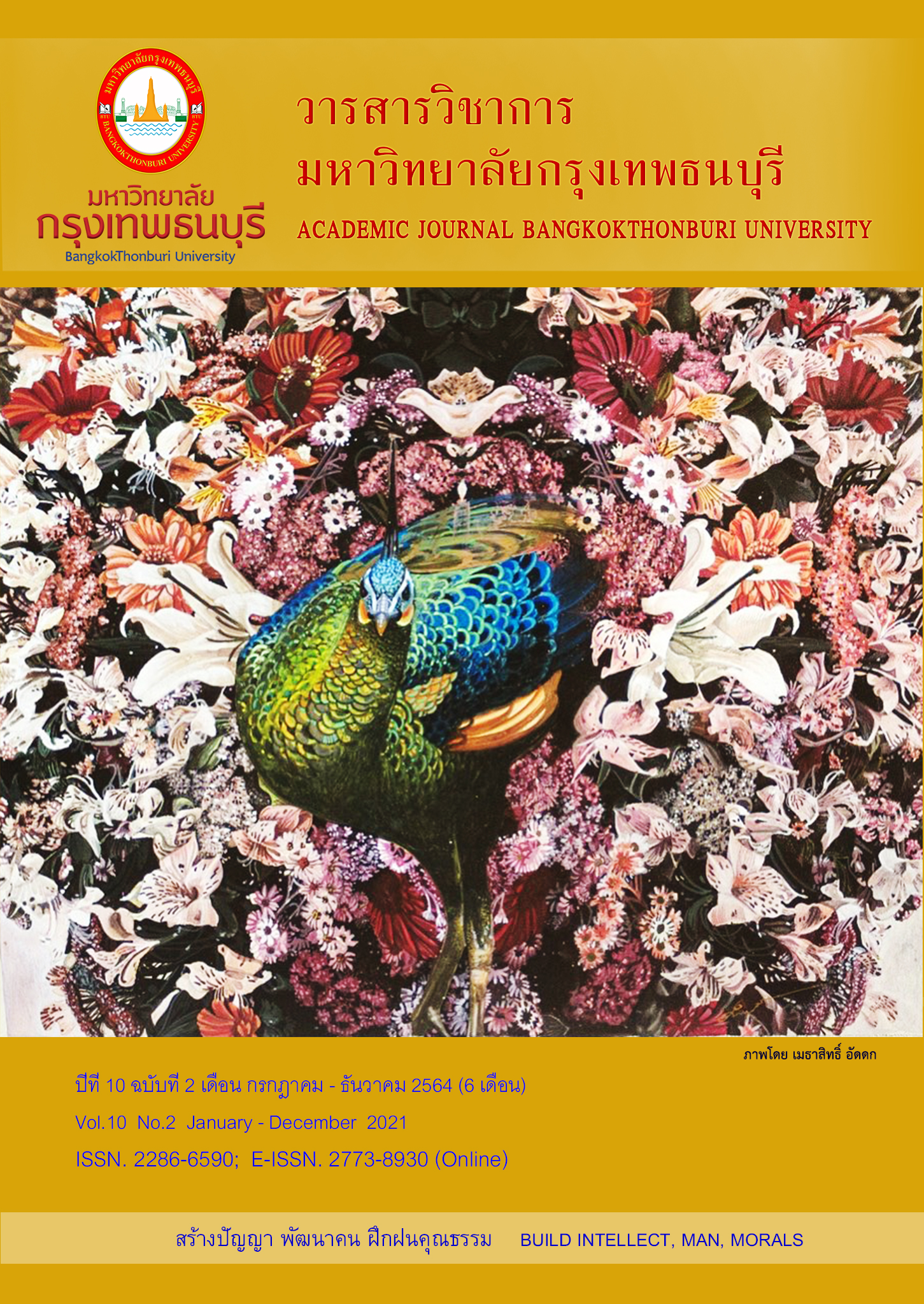Development of Hybrid Augmented Reality Media, according to Cognitive Theory Computer Assembling for Diploma High Vocational Certificate (Dip./High Voc. Cert.) The Private colleges of Technology and Vocational Education of Thailand
Main Article Content
Abstract
This research the objectives are to 1) develop integrated virtual reality technology. According to the concept of the theory of intellectualism on assembling a computer for students at the Diploma level Private College of Technology and Vocational Education of Thailand to have quality and efficiency according to the 80/80 criteria. 2) Compare the scores of pre-study test with the achievement test scores. of students at the Diploma level Private College of Technology and Vocational Education of Thailand that learns with integrated virtual reality technology based on the concept of intellectualism theory on computer assembly Private College of Technology and Vocational Education of Thailand towards learning with integrated virtual reality technology According to the concept of the theory of intellectualism on assembling a computer The sample group used in the research were students at the Higher Vocational Certificate level. Private College
of Technology and Vocational Education of Thailand Number 3 colleges with a total of
122 students using a simple random sampling method. The research tools were 1) virtual media technology 2) content quality assessment form and media production 3) pre-study test. 4) an achievement test and 5) a satisfaction questionnaire. The statistics used in the data analysis were media performance averages. Standard deviation and Dependent Sample t-test.
The results of the research showed that: 1) virtual media technology the quality assessment by content specialists and media production is of very good quality.
and efficiency according to the 80/80 criteria, which is equal to 88.00/90.00 2) the achievement test scores of students at the Higher Vocational Certificate level. Private College of Technology and Vocational Education of Thailand from learning with virtual media technology on computer assembly higher than pre-test scores with statistical significance at the .05 level and 3) the students' satisfaction with learning with the integrated virtual reality technology. According to the concept of the theory of intellectualism on assembling a computer at a high level ( = 4.14, S.D. = 0.64)
Article Details
References
VUFORIA. กรุงเทพมหานคร: Touch Point.
จินตวีร์ คล้ายสังข์. (2556). อีเลิร์นนิงคอร์สแวร์ : แนวคิดสู่การปฏิบัติสำหรับการเรียน
การสอน อีเลิร์นนิงในทุกระดับ. กรุงเทพมหานคร: สำนักพิมพ์แห่ง
จุฬาลงกรณ์มหาวิทยาลัย.
ชัยยงค์ พรหมวงศ์. (2556). การทดสอบประสิทธิภาพสื่อหรือชุดการสอน. วารสารศิลปากร
ศึกษาศาสตร์วิจัย, 5(1): 7-19.
ทิชพร นามวงศ์. (2560). การออกแบบอินโฟกราฟิกเพื่อพัฒนาความคิดสร้างสรรค์. วารสาร
สาขาวิทยาศาสตร์และเทคโนโลยี มหาวิทยาลัยศิลปากร, 4(4): 14-25.
ดำรงพล อินทจันทร์. (2559). หลัก COGNITIVISM เป็นของใหม่หรือมีมานานแล้ว. (ออนไลน์)
เข้าถึงข้อมูลจาก https://www.gotoknow.org/posts/383014
พนิดา ตันศิริ. (2553). โลกเสมือนผสานโลกจริง Augmented Reality. Executive Journal.
มหาวิทยาลัยกรุงเทพ, 30(2): 169-173.
ไพฑูรย์ ศรีฟ้า. (2556). พลิกบทบาท 3D สู่โลกความจริงเสมือน (Augmented Reality). เอกสาร
ประกอบการบรรยาย. นครปฐม: ภาควิชาเทคโนโลยีการศึกษา คณะศึกษาศาสตร์
มหาวิทยาลัยเกษตรศาสตร์.
ล้วน สายยศ และอังคณา สายยศ. (2553). เทคนิคการวิจัยทางการศึกษา. พิมพ์ครั้งที่ 11
กรุงเทพมหานคร: สุวีริยาสาสน์.
สํานักงานเลขาธิการสภาการศึกษา. (2553). ข้อเสนอการปฏิรูปการศึกษาในทศวรรษที่สอง
(พ.ศ.2552-2561). กรุงเทพมหานคร: พริกหวานกราฟฟิค จํากัด.
อนุชา พวกผกา และสุวิทย์ วงษ์บุญมาก (ม.ป.ป.). เทคโนโลยีเสมือนจริงในงานห้องสมุด. เอกสาร
ประกอบการบรรยาย. กำแพงเพชร: โปรแกรมวิชาบรรณารักษศาสตร์และสารสนเทศศาสตร์
คณะมนุษยศาสตร์และสังคมศาสตร์ มหาวิทยาลัยราชภัฏกําแพงเพชร.
Allen and Seaman. (2005). Growing by degree online Education in the
UnitedStates. [Online]. Available form:
http://elearning.ppu.edu/file.php/1/eLearning/elearning.pdf
Seels, B, and Z. Glasgow. (1998). Making Instructional Design Decisions. (2nd).
London: Merrill Publishing Company.


